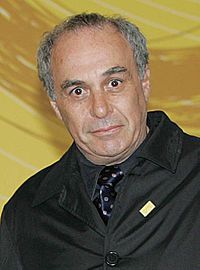Júlio Bressane
Júlio Bressane | |
|---|---|
 Bressane in 2006 | |
| Born | February 13, 1946 Rio de Janeiro, Brazil |
| Occupation(s) | Film director, writer |
| Years active | 1965–present |
Júlio Eduardo Bressane de Azevedo (born February 13, 1946) is a Brazilian filmmaker and writer.
Biography
[edit]A representative of the Brazilian cinema marginal, Julio Bressane began making films as an assistant director of Walter Lima Jr., in 1965.[1]
In 1967 Bressane debuted as director with Face to Face, being selected for the Festival de Brasília. In 1970 he founded Belair Movies in company with fellow filmmaker Rogério Sganzerla. They chose a model of making films and low-cost production and thereby managed to run six feature films in just six months.[1]
Bressane came into exile in London in the early 1970s, but returned to Brazil several years later and made one film after another, using slapstick and debauchery as its main features. An acclaimed film of this period was the provocative Tabu, released in 1982. Critics consider Bressane the most scholarly of the Brazilian film directors, and his work is notable for the diversity of its narrative language.[1] Another feature of his filmography is the comprehensive approach to historical and literary characters. He is also noted by his low-budget, short-time shootings, with an average of 11 to 14 days to make and edit a film.[2]
His film Cleopatra was presented at the Venice Film Festival in 2007, as part of the Mostra Venezia Maestri (Venice Masters Exhibition),[2] as well as being named best film of the 40th Festival de Brasília in November 2007.
Filmography
[edit]| Indicates a documentary | Indicates a short film |
| Year | Original title | English release title | Notes |
|---|---|---|---|
| 1966 | Lima Barreto: Trajetória | Short documentary on Lima Barreto. | |
| 1966 | Bethânia Bem de Perto: A Propósito de Um Show | Co-directed with Eduardo Escorel. Short documentary and concert film on Brazilian singer Maria Bethânia. | |
| 1967 | Cara a Cara | Face to Face | |
| 1969 | Matou a Família e Foi ao Cinema | Killed the Family and Went to the Movies | |
| 1969 | O Anjo Nasceu | The Angel Was Born | |
| 1970 | Cuidado Madame | ||
| 1970 | Barão Olavo, o Horrível | Baron Olavo, the Horrible | |
| 1970 | A Família do Barulho | ||
| 1971 | Memórias de Um Estrangulador de Loiras | Memories of a Blonde Strangler | |
| 1971 | Amor Louco | Crazy Love | |
| 1971 | A Fada do Oriente | ||
| 1972 | Lágrima Pantera | Brazilian-American Co-production. | |
| 1973 | O Rei do Baralho | ||
| 1975 | O Monstro Caraíba | ||
| 1977 | Viola Chinesa | Chinese Viola: My Encounter with Brazilian Cinema | Short documentary. |
| 1978 | O Gigante da América | The Giant of America | |
| 1978 | Agonia | ||
| 1979 | Cinema Inocente | ||
| 1982 | Tabu | ||
| 1985 | Brás Cubas | ||
| 1989 | Sermões: A História de Antônio Vieira | Based on the life of António Vieira. | |
| 1992 | Quem Seria o Feliz Conviva de Isadora Duncan? | Segment of Oswaldianas (1992). | |
| 1995 | O Mandarim | The Mandarin | Based on the life of Mário Reis. |
| 1997 | Miramar | ||
| 1999 | São Jerônimo | ||
| 2001 | Dias de Nietzsche em Turim | Days of Nietzsche in Turin | Based on the life of Friedrich Nietzsche. |
| 2003 | Filme de Amor | A Love Movie | |
| 2007 | Ver Viver Reviver | Short documentary. | |
| 2007 | Cleópatra | Cleopatra | |
| 2007 | Passagem em Ferrara | Short documentary dedicated to Michelangelo Antonioni. | |
| 2008 | A Erva do Rato | The Herb of the Rat | |
| 2012 | Rua Aperana 52 | Aperana Street 52 | |
| 2012 | O Batuque dos Astros | Drumming Beat of the Stars | Documentary on Fernando Pessoa. |
| 2013 | Educação Sentimental | ||
| Venice 70: Future Reloaded | Segment director. | ||
| 2015 | Garoto | Kid | |
| 2016 | Beduino | ||
| 2018 | Sedução da Carne | Seduction of the Flesh | |
| 2019 | Nietzsche sils Maria Rochedo de Surlej | Co-directed with Rosa Dias and Rodrigo Lima. | |
| 2021 | Capitu and the Chapter | Capitu e o Capítulo | |
| 2023 | The Long Voyage of the Yellow Bus | A Longa Viagem do Ônibus Amarelo | |
| Rudder of Destiny | Leme do Destino | ||
Awards
[edit]- Venice Film Festival, 2001 (Italy) – Winner of Filmcritica Bastone Bianco Award (Júlio Bressane).
- Love Film won the awards for best film, photography (Walter Carvalho) and soundtrack (Guilherme Vaz), the 36th Festival de Brasília Film in 2003
- Candango won the trophy for best film at the Festival de Brasília, by Tabu (1982) and Miramar (1997)
- Candango won the trophy for best director at the Festival de Brasília, Miramar (1997) and St. Jerome (1999)
- Award for best screenplay to Rosa Maria Dias at the Festival de Brasília by Days of Nietzsche in Turin
Books
[edit]- Some (1996)
- Cinemancia (2000)
- Fotodrama (2005)
- Deslimite (2011)
References
[edit]- ^ a b c Júlio Bressane Archived January 10, 2014, at the Wayback Machine (in Portuguese)
- ^ a b Júlio Bressane/Cleopatra
Further reading
[edit]- Schneider, Steven Jay, ed. (2007). 501 Movie Directors. London: Cassell Illustrated. p. 493. ISBN 9781844035731. OCLC 1347156402.
